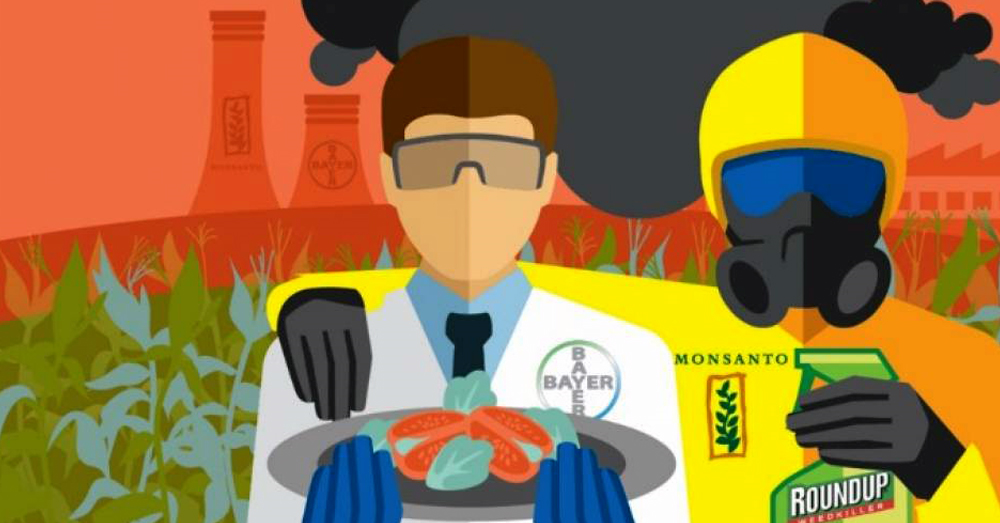
Bayer-Monsanto Merger One Step Closer to ‘A Marriage Made in Hell’
The European Commission gave formal approval of German-based Bayer’s $62.5 billion acquisition of U.S.-based agrochemical giant Monsanto last week despite widespread opposition by farmers and consumers.
March 27, 2018 | Source: Organic Consumers Association | by
The European Commission gave formal approval of German-based Bayer’s $62.5 billion acquisition of U.S.-based agrochemical giant Monsanto last week despite widespread opposition by farmers and consumers.
The approval was conditional based on Bayer’s commitment to divest some of its “overlaps in seeds, pesticides and digital agriculture,” according to a European Commission press statement. An offer by BASF SE to pay Bayer $7.4 billion for those assets, if finalized, would satisfy the commission’s competition concerns.
The Bayer-Monsanto merger, which if approved would create the world’s largest supplier of seeds and farm chemicals, is viewed by Nick Flynn of Avaaz as “a marriage made in hell” because it would give the newly created entity full control of the food chain.
Ronnie Cummins, international director of Organic Consumers Association (OCA), believes Monsanto, once dubbed the “most evil corporation in the world,” is motivated in part by the fact that the public associates the name Monsanto with Roundup Weedkiller. He says perhaps the two chemical companies hope that once Bayer controls, and possibly renames Roundup, public pressure to ban the weedkiller and its key active ingredient, glyphosate, will fade.
But that won’t happen, if consumer and environmental groups like OCA can help it, Cummins said:
“It really doesn’t matter who manufactures or sells glyphosate, or any other dangerous chemical. The damage to human health and the environment remains the same, as does our commitment to getting these chemicals out of our food system.
“This merger certainly makes the connection between Big Pharma, Big Biotech and Big Food more apparent to consumers.”
Results from a national poll released earlier this month, confirm that farmers across the U.S. believe the merger will be bad for their farms and communities.
According to the results of the survey, the farmers’ top four concerns regarding the merger are:
• Bayer/Monsanto will use its dominance in one product to push sales of other products (80 percent very concerned/12 percent somewhat concerned);
• Bayer/Monsanto will control data about farm practices (79.5 percent very concerned/12 percent somewhat concerned);
• The merger will result in increased pressure for chemically dependent farming (77 percent very concerned/12 percent somewhat concerned); and
• Conventional field crop farmers are concerned about paying more for seed (72 percent very concerned/20 percent somewhat concerned.
A recent Politico article outlined similar concerns, stating that “[t]he creation of such a large player has raised fears that farmers will lose bargaining power in the marketplace.” In a separate piece, Politico noted that environmentalists also worry that this concentration of power will minimize agricultural biodiversity and pave the way for approval of genetically engineered crops in the EU.
Indian scholar, author and activist, Dr. Vandana Shiva has serious concerns regarding approval of the merger.
In her letter to the Competition Commission of India, Dr. Shiva said that the divestitures and their claim to address Bayer and Monsanto’s overlapping activities cover up the latter’s existing licensing agreement with BASF, which should be considered when assessing the proposed merger. Speaking in this context, she concluded that:
“Asset selling as proposed in the merger will not solve the crisis faced by farmers because the market will stay [uncompetitive]. BASF to whom Bayer claims it will sell its assets already has cross licensing agreements with [Monsanto]. For the farmers the concentration over seeds and chemicals, and the negative impact of the concentration … will intensify.”
The Bayer-Monsanto merger is yet to be approved in Germany as well as in the U.S., where regulators are asking both parties to divest more assets and businesses to address antitrust issues.
According to a Bloomberg report, Bayer is aiming to finalize the acquisition by the second quarter of 2018. If approved, the Bayer-Monsanto merger will become the third major tie-up in the agribusiness sector, along with Dow-DuPont Co. and ChemChina-Syngenta. Together, these three players will control 61 percent of the global seed and pesticide market.
Organic Consumers Association is a 501(c)3 nonprofit consumer advocacy organization.
